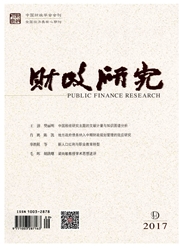

 中文摘要:
中文摘要:
本文考察了税收负担对制造业企业研发创新的影响。将城市层面的增值税负担与企业所得税负担指标与世界银行2012年中国企业调查数据进行宏微观匹配,使用工具变量修正税负指标的测量误差,实证发现:税收负担对企业研发创新的广延与集约边际决策、以及多种具体形式均具有负面影响;分样本研究揭示,税收负担对中小企业、非出口企业和民营企业的影响更严重;分税种研究揭示,增值税负担的影响比企业所得税负担更严重,且该结论对于研发创新的广延与集约边际决策、多种具体形式以及所有分样本均稳健成立。这说明,间接税具有更明显的“非中性”特征、引致的效率损失大于直接税,当前税制改革所倡导的“逐步提高直接税比重”将有助于缓解税收负担对研发创新的负面影响。
 英文摘要:
英文摘要:
This paper studies the influence of tax burden on manufacturing firm's innovation. By matching city-level value-added tax data and corporate income tax data with the firm-level data of the World Bank Chinese Enterprise Survey 2012 and using instrumental variable to correct the measurement error in tax burden data, we find that: tax burden has negative effects on the extensive and intensive margins of firm innovation as well as most specific forms. Subsample regressions show that the negative effects are severer for small and medium size firms, non-exporting firms, and private firms. We also find that value-added tax is more distortionary than corporate income tax. This indicates that the tax system reform which aims at gradually increasing the proportion of direct taxes will alleviate the negative effects of tax burden on firm innovation.
 同期刊论文项目
同期刊论文项目
 同项目期刊论文
同项目期刊论文
 期刊信息
期刊信息
